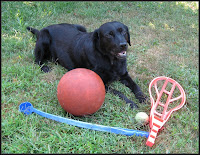Like humans, dogs need to ingest certain types of essential fatty acids.
Yet conflicting advice exists about what types of essential fatty acids dogs need. I decided to look it up myself in the online Merck Veterinary Manual --- an excellent source for information on animal health and nutrition.
[Note: To minimize confusion, mention of omega-6 fatty acids are color-coded in red. Mention of omega-3 fatty acids are color-coded in blue.]
According to Merck, dogs need linoleic acid; an omega-6 essential fatty acid found, “in appreciable amounts,” in corn and soy oil.
The Merck Manual further states, “Recent studies suggest that α-linolenic acid is also essential in dogs...” A-linolenic acid (ALA) is alpha linolenic acid, the omega-3 fatty acid found in fish, flax and other oils.
It's important for Doggie Chefs to know HOW MUCH of these fatty acids to feed a dog.
The Merck Manual states the amount of dietary ALA (alpha linolenic acid, omega-3) a dog needs depends on the diet’s LA (linoleic acid, omega-6) content. It’s important a dog consumes the correct balance (ratio) of omega-3s to omega-6s to avoid health problems.
So in addition to getting the calcium-to-phosphorus ratio right (click
here for my post about that),
Doggie Chefs must also be careful to give their dogs the right
omega-3 to
omega-6 ratio!
It sounds difficult, but it’s easy to do.
According to the Merck Manual, the required amounts of omega-3 fatty acids are presently unknown but the current MINIMAL recommendation for an adult dog is, "0.44 g/kg diet ALA (omega-3) when linoleic acid (omega-6) is 11 g/kg diet (dry-matter basis)."
*** To put it plainly, it's recommeded an adult dog consume a ratio of AT LEAST .44 alpha linolenic acid (omega-3) to 11.0 linoleic acid (omega-6) ratio. Which is:
AT LEAST 1 part omega-3 fats: 25 parts omega-6 fats
Gracie's diet contains both omega-6 and omega-3 fats.
Most of the foods I feed her contain a lot of omega-6 fats. I cook her eggs and meats in vegetable oils high in omega-6 fats, such as corn or canola (which also contains omega-3 fats). I also add ¼ teaspoon of cold pressed sunflower oil (high in omega-6 fats) to Gracie’s food once a week.
To provide omega-3 fats I feed Gracie fish, two to four days a week. I also sprinkle about 1/8 teaspoon of ground flax seed on her food once a week although I'm not convinced it's a great nutritional benefit. I think fish is a better source of omega-3 essential fatty acids than flax. One time I took a vet's advice For a while and supplemented Gracie's meals with small amounts of flax oil. I did that for a few months. Another time I gave Gracie a fish oil supplement for extra omega-3 fats for a few months. I added about 3/4 of the liquid contained in one fish gel oil capsule to a meal once of twice a week. Now I prefer Gracie get most of her omega-3 fats from whole foods, like fish; rather than from oil supplements or from ground flax seeds.
 Gracie loves to play fetch with a tennis ball. And she loves to push and pull a basketball around the backyard.
Gracie loves to play fetch with a tennis ball. And she loves to push and pull a basketball around the backyard.  I sometimes skip Gracie’s playtime in the summer if outdoor temperatures are very high. Even when she was younger, Gracie made it clear she doesn’t like playing outside for long in very hot weather. After about 15 minutes of playtime in very hot weather she’ll walk slowly to me, and then to the door. She’ll stand there, watching me and waiting until I let her inside.
I sometimes skip Gracie’s playtime in the summer if outdoor temperatures are very high. Even when she was younger, Gracie made it clear she doesn’t like playing outside for long in very hot weather. After about 15 minutes of playtime in very hot weather she’ll walk slowly to me, and then to the door. She’ll stand there, watching me and waiting until I let her inside. 



